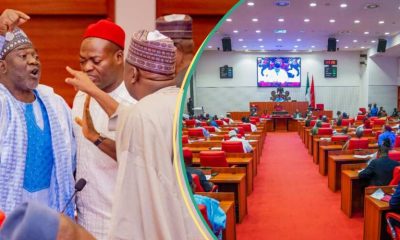Angered over a court ruling restraining it from further deliberation on the amendment of the electoral, the Senate on Thursday said it has resolved to write a letter to Walter Onnoghen, Chief Justice of Nigeria (CJN).
Recall that a political party, the Accord Party had on Wednesday secured a restraining order from a federal high court in Abuja, ordering further deliberation on the matter until March 17, the adjourned date.
The court, in a ruling delivered by Justice Ahmed Mohammed, ruled that all parties in the matter to maintain status quo antebellum, “at least between now and the next adjourned date.”
The presiding judge invoked section 6(6) of the 1999 constitution, as amended, which according to him, empowered the court to protect the Res (subject matter) of the substantive suit pending before it
Mohammed ruled that if the National Assembly went ahead to exercise its powers by overriding the president, the essence of the suit would be defeated.
However, moving a motion on the floor of the Senate, Godswill Akpabio, Senate Minority Leader, wondered if a court injunction could stop the National Assembly from carrying out its constitutional functions.
The Minority Leader said the matter should be taken “very seriously” to forestall reoccurrence of its nature in future.
“The issue really is not the bill itself, it has to do with due process and parliamentary functions. I am worried about the situation of powers as enshrined in our constitution,” he said.
“Can the court really rule an injunction, expatriate or otherwise, to stop the parliament from carrying out its constitutional duties? I have looked through the Nigerian constitution, and in my view, I don’t think it is right for the court to interfere in the affairs of the parliament, particularly when we are in the process of making legislation. We cannot be stopped by an injunction.
“But be that as it may, I believe strongly that we also do not have the power to arrest a court judgement while the proceedings are going on and because of separation of powers.”

 Business1 week ago
Business1 week ago
 Football1 day ago
Football1 day ago
 Business7 days ago
Business7 days ago
 Education1 week ago
Education1 week ago
 Crime1 week ago
Crime1 week ago
 Covid-197 days ago
Covid-197 days ago
 Business1 week ago
Business1 week ago
 Latest5 days ago
Latest5 days ago













